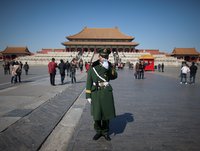Registration
Thank you!
You will receive an email confirming your registration.
IMGXYZ3579IMGZYXThe Carnegie Tsinghua Center for Global Policy hosted a roundtable discussion with Chinese scholars to explain the shifts in regional power dynamics in East Asia. Carnegie-Tsinghua’s Sun Xuefeng moderated the discussion.
What Role Does Ancient Chinese Thought Play?
- Conquering the World: Chinese scholars should publish more works to solidify China’s commitment to regional and international peace, asserted Yan Liang. Looking at China’s 5000 years of history, he argued that no dynasty had ever employed the necessary force or had ambitions to conquer the world. Alternatively, ancient China preferred pacifying neighbors and viewed regional stability as a more important to conquest, he explained. It is not, and never has been, in China’s interests to subvert world order, he concluded.
- Argumentative Roadblocks: There is a real limit to drawing comparisons between ancient and modern China, argued Zhou Fangyin. Modern industrial China is not the same as the agricultural ancient China, and many will criticize the legitimacy of a comparison between the two. Furthermore, Zhou added, high historical cost of conquest limited the ability of ancient China, while the ease of modern weapons and technology can facilitate conflict.
Domestic Relations
- Foreign Policy: China’s internal affairs somewhat restrict Beijing’s foreign policy, asserted Xu Jin. Xu suggested that Beijing’s priority is dealing with the relations between central and local governments within China. The relations between China and its neighbors are a second priority, and relations between China and the world a distant third. This priority system can be seen in a wide range of issues, Jin added.
- Priorities Change: While many feel that foreign policies are held second to domestic issues, Gao Cheng noted that the central government determines the priority. Gao warned against making a too sweeping generalization, since the importance of any given policy often depends on the individual circumstances.
Further Research Needed
- Pre-Qin Thoughts on East Asia Stability: Xu stressed the importance of researching the effect of Chinese thoughts on East Asian stability during the pre-Qin periods by collecting details of ancient China’s foreign relations. He suggested that this type of research should focus on specific measures China pursued to stabilize the region.
- Tributary System: Gao added that he thinks research on how economic relations affected the tributary state system could be used to consider how the tributary system’s policies might be adapted to China’s capitalist model.
- Seminars: Sun and Zhou discussed the benefits of offering a seminar class for PhD candidates, focusing on the order in Modern East Asia.
Discussants:Yan Liang, Zhou Fangyin, Xu Jin, Gao Cheng
